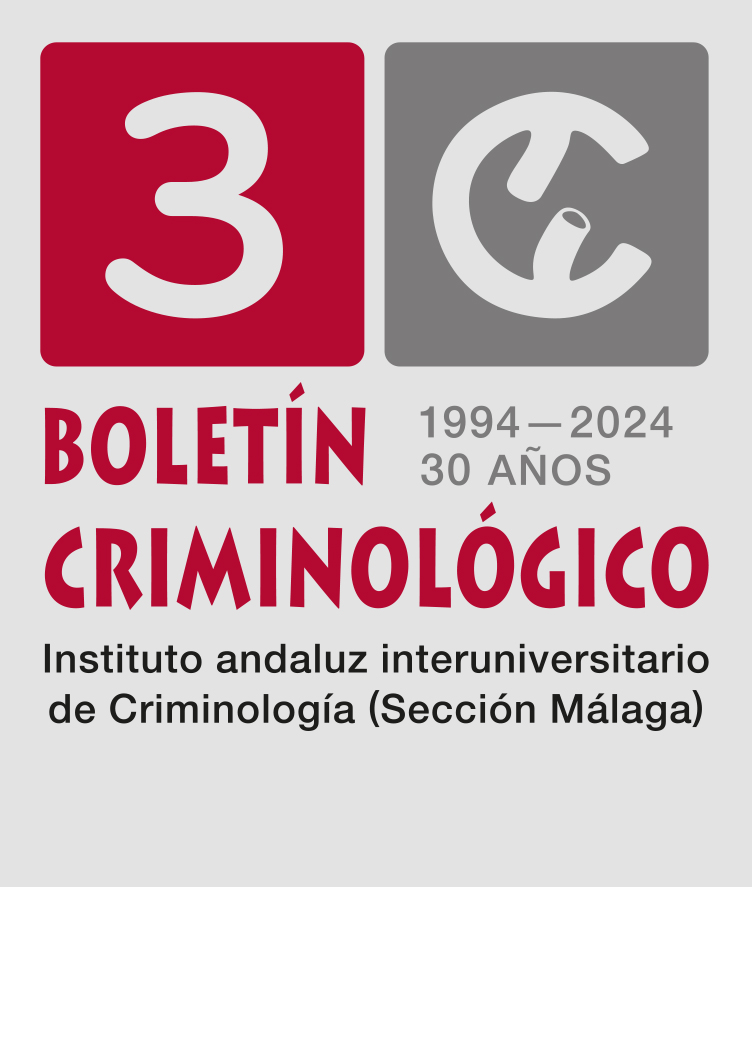Mothers with addictions in prison: profile, prison experiences and future expectations
DOI:
https://doi.org/10.24310/bc.30.2024.20684Keywords:
incarceration, motherhood, addictionsAbstract
The addictions of incarcerated people constitute a central issue in the analysis of the penal and penitentiary system in our country, given the high number of people who have offended as a result of these addictions. Among the female prison population, alcohol and/or drug consumption is very high. So is the number of imprisoned mothers. Hence, the main objective of this paper is to bring together the relationship between motherhood and addictions among women in prison. For some women, drug use entails both the loss of custody of their children and, in some cases, the revocation of prison benefits. To this end, we will outline the profile of incarcerated mothers who are drug users, also giving an account of their experiences in prison and their expectations for the future.
Downloads
Metrics
References
ARISTIZÁBAL BECERRA, L. A., y CUBELLS SERRA, J. (2017): “Delincuencia femenina y desistimiento: factores explicativos”, en Universitas Psychologica, 16 (4), 6-19.
BARNES, S. y CUNNINGHAN, E. (2014): “Is motherhood important? Imprisoned women’s maternal experiences before and during confinement and their post release expectation”, en Feminist Criminology, 9 (I).
BATEMAN, T. i HAZEL, N., (2014): Resettlement of girls and young women: a practitioner’s guide “Beyond youth custody”. Disponible en: http://usir.salford.ac.uk/33028/1/BYC_-_Resettlement_of_girls_and_young_women.pdf.
BAYBUTT, M., CHEMAL, K. (2016): “Health-promoting prisons: theory to practice”, en Global health promotion, 23 (1), 66-74.
BODELÓN, E. (2012): “La violencia contra las mujeres en situación de prisión”, en Revista da EMERJ, 15 (57), 111-129.
CARLSON J., (2001): “Prison nursery 2000”, en Journal of Offender Rehabilitation, 33 (3), 75-97.
CASEY-ACEVEDO, K.; BAKKEN, T. y KARLE, A.; (2004): “Children visiting mothers in prison: the effects on mother’s behaviour and disciplinary adjustment”, en The Australian and New Zealand Journal of Criminology, 37 (3).
CID MOLINÉ, J., y MARTÍ OLIVÉ, J. (2011): “El proceso de desistimiento de las personas encarceladas. Obstáculos y apoyos”, en Centre d’Estudis Jurídics i Formació Especialitzada.
DE MIGUEL, E. (2015): “Mujeres usuarias de drogas en prisión”, en Praxis Sociológica, (19).
GIORDANO, P. y otros, (2011): “Parenthood and crime: the role of wantedness, relationships with partners and SES”. Journal of Criminal Justice, 39 (5), 405 y ss. Disponible en: http://www.sciencedirect.com/science/article/pii/S0047235211000705.
HONTORIA, E. y BOOKER, A. (2008): “Contact between incarcerated mothers and their children”, en Journal of Offender Rehabilitation.
IBÁÑEZ, A. y PEDROSA, A. (2018): Cárcel y familiarismos: ¿Usamos a las familias como agencias de reinserción?. Encrucijadas.
MAPELLI, B, HERRERA, M y SORDI, B. (2013): La exclusión de las excluídas. ¿Atiende el sistema penitenciario a las necesidades de género? Una visión andaluza, en Estudios penales y criminológicos, 33.
Mc CARTHY (1980): “Inmate mothers: the problem of separation and integration, en Journal of Offender Counselling, Service and Rehabilitation, 4 (3).
McIVOR, G., MURRAY, C., JAMIESON, J. (2004): “Desistance from crime: is it different for women and girls?”. En MARUNA, S. e IMMARIGEON, R. After crime and punishment. Pathways to offender reintegration, Willan Publishing, 181-197.
McIVOR, G. y otros (2009): “Women, resettlement and desistance”, en Probation, 56 (4), 347-361.
MOSES, M.C. (2006): “Correlating incarcerated mothers, foster care and motherchild reunification”, en Corrections Today, (68).
MUMOLA, C. (2000): “Incarcerated parents and their children”, en Bureau of Justice Statistics, Special report.
Myers, B. y otros, (1999): “Children of incarcerated mothers”, en Journal of Child and Family Studies, (8), 11-25.
NAVARRO, C. (2018): El encarcelamiento femenino. Especial consideración a las madres privadas de libertad. Atelier.
NAVARRO, C., HERNÁNDEZ, N., y RUIZ DE LA FUENTE, C. (2023).: “L’exercici de la maternitat en el sistema penitenciari català. Maternitat i
presó”, en Observatori Català de la Justícia en violència masclista i CEJFE. Disponible en: https://cejfe.gencat.cat/web/.content/home/ocjvm/publicacio/publicacions/2023/exercici-maternitat-centre-penitenciari/Exercici_de_la_
maternitat_del_sistema_penitenciari_catala_CA_ACC.pdf
NAVARRO, C., MELÉNDEZ, A., y CUBELLS J. (2022): “Incarcerated women’s experiences in Spain”. En MASSON, I., y BOOTH, N. (Eds.). The Routledge Handbook of Women’s Experiences of Criminal Justice. Routledge. Disponible en: https://doi.org/10.4324/9781003202295
NAVARRO, J.C. y otros. (2016): “Incidencia del trastorno límite de personalidad en mujeres encarceladas”. Centre d’Estudis Jurídics i Formació Especialitzada.
OBSERVATORIO ESPAÑOL DE LAS DROGAS Y LAS ADICCIONES. (2022): Estadísticas 2022. Alcohol, tabaco y drogas ilegales en España. Disponible en: https://pnsd.sanidad.gob.es/profesionales/sistemasInformacion/informesEstadisticas/pdf/2022OEDA-INFORME.pdf
RODERMOND, E., KRUTTSCHNITT, C., SLOTBOOM, A.M., BIJLEVELD C., (2016): “Female desistance: a review of the literature”, en European Journal of Criminology, 13 (1), 3-28.
UNAD (2022): Situación de las personas con adicciones en las prisiones españolas. Una visión con perspectiva de género. Disponible en: https://www.unad.org/wpcontent/uploads/2023/06/estudio-prisiones-2023.pdf
Downloads
Additional Files
Published
How to Cite
Issue
Section
License
Copyright (c) 2024 Boletín Criminológico

This work is licensed under a Creative Commons Attribution-NonCommercial 4.0 International License.
Con la aceptación de este aviso el/los autor/es declara/n:
- Que el artículo se deriva de una investigación propia, que no ha sido publicado en el mismo formato que se presenta y que no está siendo objeto de postulación para su publicación en otra revista simultáneamente y con el mismo formato.
- Que acepta/n someter a evaluación el artículo, y a proceder en el término establecido a las correcciones que se indiquen, como condición para su publicación.
- Que existe conformidad con la política editorial de la revista Boletín Criminológico en lo relativo a la difusión de sus contenidos por correo electrónico en el formato pdf, y a través de su página web y de los directorios de revistas en los que está indizada .
- Que a tal efecto, por la presente el/los autor/es cede/n los derechos de difusión y reproducción del artículo presentado al Boletín Criminológico para todas las ediciones de la revista.
La revista se publica bajo el sistema de licencias Creative Commons según la modalidad «Reconocimiento – NoComercial (by-nc): Se permite la generación de obras derivadas siempre que no se haga un uso comercial. Tampoco se puede utilizar la obra original con finalidades comerciales». La revista se publica y se gestiona mediante el software Open Journal Systems.







3.png)
